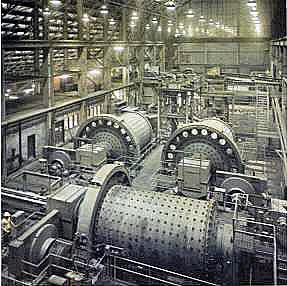Granduc Mine

Milling - Continued
Photo - Grinding Bay
The crushed product was delivered to a discharge conveyor which was, concurrently, picking up the minus 6-in. ore that by-passed the grizzly as noted above and delivered, after passing under a tramp-iron magnet, via a 48-in. transfer conveyor, inclined at 16 degrees, either directly to No.3, 2,000- ton waste bin in the case of waste or, through a system of feed conveyors and transfer chutes to Nos. 1 and 2 bins, each with a capacity of 3,000 tons.
A part of the grinding section. From these bins, ore was drawn through undercut arc-loading gates which use the railroad car as a volumetric hopper so that flow ceases when the ore level builds up to the loading-chute lip. The car, one of 20 having a capacity of 50 tons used in the haulage through the tunnel to Tide, was slowly drawn through the loading position until full at which point the gate was closed by upward rotation. Chance of spillage had been found to be slight.
The cars were open hoppers with individual air cylinders and were arranged for side-dumping in either direction. At the end of the run to Tide, the ore was dumped into a 3,000-ton pocket in rock about 1,100 feet inside the portal on a spur track. Another spur track, leaving the snowshed just outside the portal, went to a dump area for disposal of the mine waste.
During observation of these various crushing, conveying, storage, haulage, and dumping operations, it became obvious that a great deal of attention had been paid to level controls and alarms for extraordinary conditions such as over-loading. While too detailed to describe here, it can be said that the system in effect provided for a smooth flow of the ore from the crushing unit underground to the underground pocket from which it was removed and conveyed over a 42-in. belt 2400 feet long first through a concrete tunnel and then a steel pipe to the top of the concentrator building in preparation for further reduction and treatment.
MILLING-CONTINUED